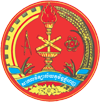Introduction
Why Studying IBM at RUPP?
The study of international business is increasingly important. Technological, political, and economic development mean that daily business transactions can be conducted on a global scale, where international managers have added advantages in the employment market and raw materials.
This Degree offers students with a broad, analytical and integrated study of business processes specifically geared to global issues such as international strategy and cross-cultural management. It is ideal for those wishing to pursue a general business management degree, with the added benefit of a global outlook and international orientation.
Students will be equipped with the skills required to be successful in business within the highly competitive international environment and develop an understanding in the field of entrepreneurship and real work situation in multi-national corporation.
How Do We Teach IBM at RUPP?
In the IBM Program you will encounter different forms of teaching, which may be different from what you are used to from high school. Class sizes vary per teaching form and can range from 40 students up to 80 students. We will describe some of the most common teaching forms.
Working in Teams
Teams are collaborative units of people joined together to accomplish a common goal. The output of the whole team should exceed that of the sum of the output of individual members. As work processes and production systems have become more complex, teams -not individuals - have become the basic working unit in many modern international organizations. Because team environments foster interaction and open communication, and create a desirable setting for generating new ideas, the ability to function effectively as a member of an interdisciplinary team has become essential. In the IBA program team work will be used in many courses.
What makes team work essential for IBM students?
The business world requires graduates to have extensive competences in working and learning in teams.
Research shows that well-organized collaboration between students has positive effects on learning results, learning productivity, the relationships between the students, individual self-confidence as well as well-being of students.
If a team performs well, individual team members can take advantage of several kinds of synergy effects. Synergy is best described as "1 + 1 = 3" rather than 2. For your learning process this means that you can learn much more in a course when you work in teams.
Lectures & Instruction Lectures
Lectures usually take place once a week with all students from the program present in one big lecture hall. For some courses the group might be split in two parts, with students being assigned to one of the lectures. During the lecture the instructor will outline the theoretical concepts described in the literature to be studied for the course, usually making use of a PowerPoint presentation to help you understand and take notes. Real-life examples to further explain these theories are used, such as newspaper articles, videos and cases.
Instruction lectures take place for quantitative courses like Statistics and form the link between the theory and practical application in assignments. The instruction lectures will help you prepare yourself for the tutorials and explain how you should apply the theory.
Tutorials and Skill Tutorials
Tutorials are usually offered after the lectures and instruction lectures. Tutorials offer you the opportunity to explore the course materials in more details, work on assignments and cases, ask questions, join in group discussions and share ideas with the instructor and your fellow students. Tutorials have an interactive format and students are required to come prepared. Some tutorials may have mandatory attendance.
The skills tutorials are a special type of tutorial explicitly designed to develop academic and business skills. The skills tutorials are linked to regular courses, as skills development is an integral part of the learning process in the IBA program. In the skills tutorials you will practice writing and presentation skills and apply the learned skills in assignments that are integrated in your regular courses. Preparation and active participation are mandatory. Group size varies between 20 - 40 students per group.
PC Lab sessions
For some courses in the IBM program more advanced computer skills are necessary. Therefore, PC Lab sessions are offered to teach students these skills and let them work on the application of theory on practical assignments.
Academic Advisor
IBM program at RUPP has an academic advisor. You can talk with the academic advisor about methods of planning and study, disappointing results, binding study advice, but also about personal matters such as illness, adjusting to university life or domestic problems.
Student Counselling
RUPP also has Student counsellor stations in room 309 of RUPP’s main building that is available for questions, doubts or problems related to study or personal issues.
Student Mentors (buddies)
As a first-year IBM student you will have a mentor (buddy), an older student from the school who will be your guide during the introduction period and first year. Your mentor can help you with study related questions and settling in at the university. The Mentorship System also organizes tutorship, private coaching and exam training for courses in the IBM program.
Contact Info

- Dr. PHOU SAMBATH
- Head Department
- Tel: (+855) 78666779
- Email: sambathphou@yahoo.com
- Address: Room 317B, Main Campus (Building A), Royal University of Phnom Penh, Russian Federation Blvd., Touk Kork, Phnom Penh 12101 Cambodia
Scholarship

For students who are looking for a scholarship, RUPP provides a number of sources of scholarships. read more...
